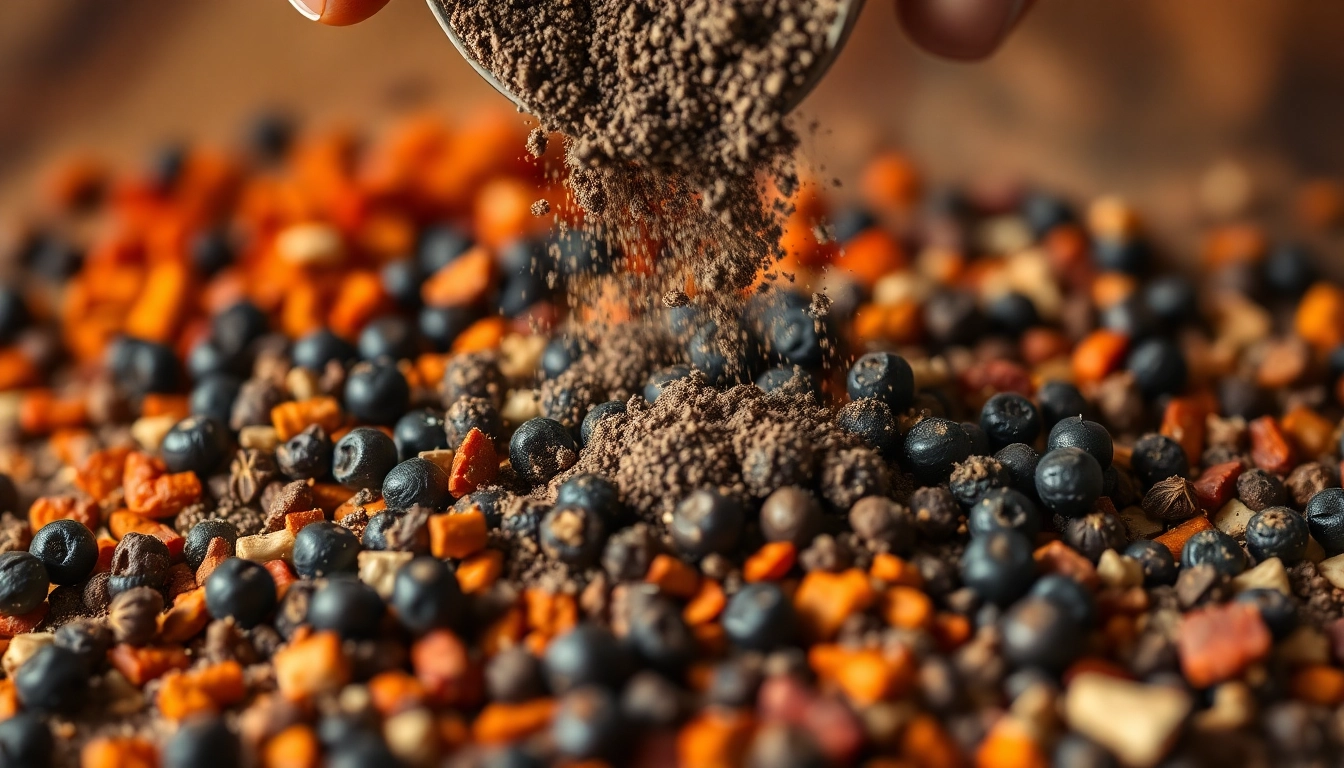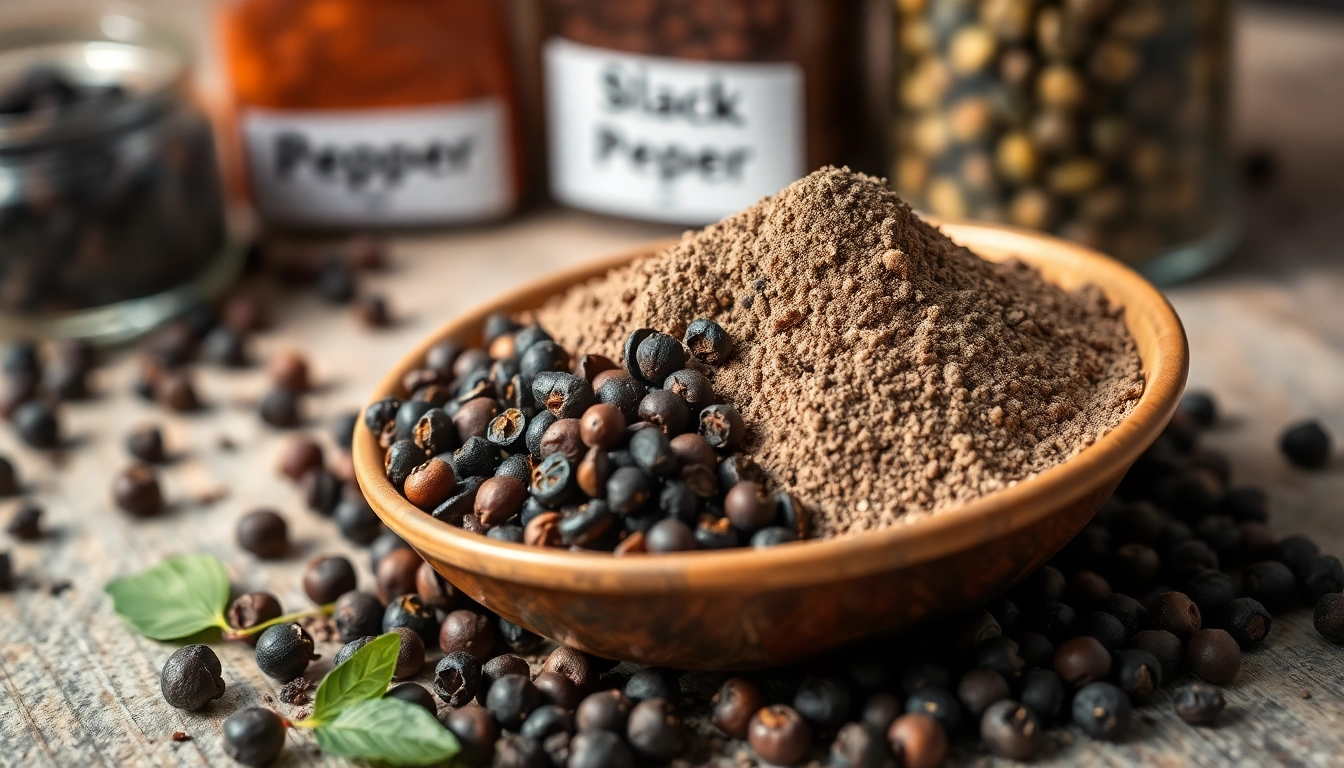The Critical Role of Black Pepper Powder in Modern Culinary Practices
Black pepper powder is a cornerstone ingredient in kitchens worldwide, revered for its distinct aroma, pungency, and flavor-enhancing properties. As a versatile spice, it elevates dishes ranging from traditional favorites to innovative culinary creations. Understanding the nuances of black pepper powder — from its historical roots to contemporary applications — can significantly improve culinary outcomes and elevate food quality. For those seeking the highest quality and authentic products, exploring suppliers like Black Pepper Powder offers a reliable source to access superior-grade spices that meet international standards.
This comprehensive guide aims to demystify black pepper powder’s significance, sourcing, culinary uses, and tips to maximize its flavor potential, ensuring both amateur cooks and professional chefs can optimize their dishes. As a prominent manufacturer and exporter with certifications gained through participation in major food exhibitions worldwide, Spice Nest exemplifies excellence in delivering authentic, high-quality products that contribute to culinary artistry.
Understanding the Significance of Black Pepper Powder in Culinary Heritage
Historical Significance and Cultural Uses
Black pepper, often dubbed the “King of Spices,” boasts a history dating back over 4,000 years. Native to the Malabar Coast of India, it was once a coveted commodity known as “black gold” and played a pivotal role in global trade routes. Ancient civilizations valued black pepper not just as a flavor enhancer but also for its medicinal properties. Its cultural importance is reflected in traditional recipes across India, Southeast Asia, and Africa, where it is incorporated into rituals, medicinal formulations, and everyday cooking.
Historically, black pepper was used in Ayurvedic medicine to improve digestion and stimulate circulation. In Indian cuisine, particularly within the regions of Gujarat and Rajasthan, black pepper is an integral component in spice blends such as garam masala and has historically symbolized prosperity and hospitality. This deep cultural significance underscores its ongoing relevance in preserving culinary identities and heritage.
Health Benefits and Nutritional Value
Today, scientific research affirms black pepper’s numerous health benefits. Rich in piperine, an active compound responsible for its spiciness, black pepper exhibits antioxidant, anti-inflammatory, and antimicrobial properties. It aids in digestion by stimulating gastric juices, enhances nutrient absorption, and may improve brain function.
Nutritionally, black pepper is low in calories but dense in vital nutrients such as vitamin K, iron, manganese, and dietary fiber. Its inclusion in daily diets can support weight management, improve cardiovascular health, and potentially reduce the risk of certain diseases.
Different Types of Black Pepper Powder and Their Flavors
Various types of black pepper powders are available, each with distinct flavor profiles influenced by origin, processing, and grade. The most common classifications include:
- Tellicherry Black Pepper: Known for its bold flavor, larger berries, and complex aroma, often regarded as premium-quality pepper.
- Malabar Black Pepper: Characterized by its bold, pungent taste with a hint of fruitiness, sourced from the Malabar Coast.
- Betel Black Pepper: Slightly milder, with a balanced heat, suitable for delicate culinary preparations.
Each variety offers unique flavor nuances, allowing chefs to select the ideal profile for specific dishes or cuisines. When choosing black pepper powder, factors such as grind size, aroma, and freshness are vital for maximizing flavor.
Source Selection and Storage for Quality Maintenance
How to Select the Best Black Pepper Powder in the Market
Choosing high-quality black pepper powder is crucial for superior taste and health benefits. Key indicators include:
- Color: Deep black with a glossy appearance indicates freshness.
- Aroma: Strong, pungent, and aromatic scent signifies freshness and potency.
- Grinding: Fine, uniform grind ensures even flavor distribution.
- Packaging: Airtight, opaque packaging preserves essential oils and prevents moisture ingress.
Always source from reputable suppliers like Spice Nest, which provides certified, authentic spices, ensuring your recipes benefit from genuine quality.
Proper Storage Tips
To maintain the freshness and flavor integrity of black pepper powder, proper storage is essential:
- Container: Use airtight, moisture-proof containers made of glass, stainless steel, or high-quality plastic.
- Environment: Store in a cool, dark place away from direct sunlight and humidity.
- Frequency: Regularly check for freshness; ground spices tend to lose aroma faster than whole spices.
- Quantity: Purchase in quantities suitable for your usage to minimize exposure time.
Grinding and Measuring Techniques
For optimal flavor, grinding your own black pepper using a burr grinder just before use preserves essential oils and aroma. For recipes requiring pre-ground pepper, measure accurately with measuring spoons or a digital scale for consistency. Always grind or measure in small batches to maintain freshness and prevent clumping.
Integrating Black Pepper Powder into Diverse Culinary Expressions
Classic Recipes: Enhancing Meats, Vegetables, and Soups
Black pepper powder is a staple in seasoning meats like chicken, beef, and lamb, imparting a bold heat and depth. It is integral to marinades, rubs, and spice blends that define traditional dishes. In vegetable preparations, especially roasted or sautéed, black pepper enhances natural flavors and adds complexity. Soups and broths benefit from a dash of freshly ground black pepper to elevate aroma and zest.
Innovative Fusion Recipes with Black Pepper
Modern cuisine increasingly explores fusion dishes where black pepper complements global ingredients. Examples include black pepper-crusted tuna, black pepper-infused pasta sauces, or creamy cheese dishes with a pepper twist. Its potent flavor provides a spicy contrast to sweet, sour, or savory components, creating memorable flavor profiles.
Marinades, Sauces, and Spice Blends
Black pepper powder is essential in preparing marinade blends for grilling or roasting, often paired with garlic, herbs, and acidic ingredients. It significantly contributes to sauces, such as peppercorn sauce or pepper-flavored chutneys. Creating custom spice blends like Moroccan Ras El Hanout or Indian garam masala involves high-quality black pepper for balanced complexity.
Tips & Tricks for Maximizing the Flavor of Black Pepper Powder
Balancing Black Pepper with Other Spices
The key to using black pepper effectively is balancing it with other spices. When integrating into complex dishes, consider the intensity of other components — subtle herbs for delicate dishes, bold spices like cumin or cloves for rich flavors. Combining black pepper with ingredients like cumin, coriander, or chili creates layered spice profiles.
Cooking Techniques to Enhance Aroma and Zest
To unlock black pepper’s full aromatic potential, add it at different stages:
- Early Addition: Incorporate during cooking to mellow the heat and develop aroma.
- Finishing: Sprinkle freshly ground black pepper just before serving for a sharp, pungent impact.
Toasting black pepper in dry pans or oil briefly before incorporating into dishes enhances its aroma and flavor, similar to how roasting spices brings out deeper notes.
Common Mistakes & How to Avoid Them
Overusing black pepper can lead to overpowering heat, masking other flavors. Grinding too early may cause the loss of essential oils, diminishing aroma. To prevent this, grind fresh in small quantities when needed, and use judiciously according to recipe requirements.
Enhancing Food Quality & Pairings with Black Pepper Powder
Impact on Dish Complexity and Aroma
Black pepper elevates dishes by adding dimensionality, balancing richness with piquancy, and enhancing overall aroma. Its pungency awakens the palate, making flavors more vibrant and memorable. Proper inclusion ensures a harmonious blend that complements ingredients transparently without dominance.
Best Pairings and Beverage Suggestions
Classic pairings include red wines like Cabernet Sauvignon and Merlot, which complement the spice’s burn. Beers such as IPAs or stouts also marry well with black pepper-infused foods. For non-alcoholic options, tangy lemonades or ginger teas accentuate the spice’s zest.
Customer Feedback and Preferences
Consumers appreciate black pepper in dishes that showcase bold flavors, especially in grilled meats, savory snacks, and ethnic cuisines. Premium black pepper powders, like those from Spice Nest, receive positive reviews for their aroma, potency, and consistency, reinforcing the importance of sourcing authentic products.

